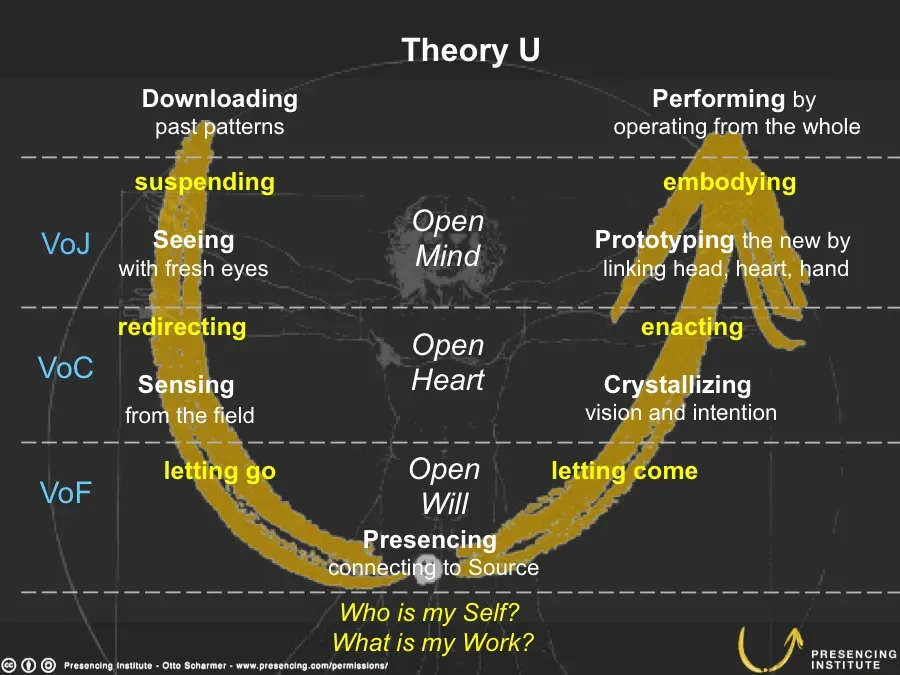Theory U Overview
A Framework for Transformative Change
Theory U, developed by Otto Scharmer at MIT, offers a powerful framework for leading profound change. Unlike traditional change management approaches that focus on past experiences, Theory U emphasizes learning from the emerging future.

Originally posted on Pascal Polleunus’ website.
What Is Theory U?
Theory U provides a framework and methodology for profound innovation and change. It suggests that the quality of results in any kind of system depends on the quality of awareness, attention, and consciousness of the participants in that system.
The “U” represents the journey of transformation that individuals, teams, and organizations undergo to access their deepest sources of creativity and bring emerging possibilities into reality.
Core Principles
1. Open Mind
- Suspending habitual judgment
- Seeing with fresh eyes
- Challenging existing assumptions
- Being curious and questioning
2. Open Heart
- Empathizing with others
- Building emotional connections
- Sensing beyond surface level
- Engaging authentically
3. Open Will
- Letting go of old identities
- Being open to emerge
- Connecting to future potential
- Committing to what emerges
The U Process
1. Co-Initiating
- Building common intent
- Creating shared purpose
- Establishing core teams
- Defining scope and context
2. Co-Sensing
- Deep observation
- Immersing in context
- Learning journeys
- Connecting to reality
3. Presencing
- Connecting to source
- Accessing inner knowing
- Letting go of old patterns
- Letting new possibilities emerge
4. Co-Creating
- Rapid prototyping
- Learning by doing
- Integrating head, heart, hand
- Creating microcosms
5. Co-Evolving
- Embodying new practices
- Growing innovation ecosystems
- Scaling what works
- Creating infrastructures
Practical Application
1. Individual Practice
- Deep listening
- Mindfulness
- Journaling
- Contemplative practices
2. Team Practice
- Dialogue walks
- Case clinics
- Stakeholder interviews
- Learning journeys
3. Organizational Practice
- Innovation labs
- Transformation journeys
- Prototyping initiatives
- System mapping
Key Tools and Methods
1. Sensing Tools
- Stakeholder interviews
- Learning journeys
- Shadowing
- Deep observation
2. Presencing Tools
- Silence practices
- Generative listening
- Journaling
- Nature immersion
3. Prototyping Tools
- Rapid cycle testing
- User feedback integration
- Iterative development
- Living examples
Common Challenges and Solutions
1. Resistance to Change
Challenge: Habitual patterns and fear
Solutions:
- Creating safe spaces
- Building trust
- Small wins
- Collective practices
2. Maintaining Momentum
Challenge: Sustaining engagement
Solutions:
- Regular practice
- Support structures
- Clear milestones
- Shared learning
3. Scaling Impact
Challenge: Moving beyond pilots
Solutions:
- Infrastructure building
- Network development
- Knowledge sharing
- System activation
Success Factors
1. Leadership Commitment
- Executive sponsorship
- Resource allocation
- Personal engagement
- Role modeling
2. Safe Container
- Trust building
- Psychological safety
- Open communication
- Supportive environment
3. Regular Practice
- Consistent application
- Learning integration
- Reflection time
- Skill development
4. System Perspective
- Stakeholder engagement
- Context awareness
- Pattern recognition
- Ecosystem thinking
Measuring Progress
1. Quality of Ideas
- Innovation level
- Solution viability
- Stakeholder feedback
- Implementation success
2. Team Development
- Collaboration quality
- Trust levels
- Learning integration
- Collective capacity
3. System Impact
- Stakeholder engagement
- Behavioral changes
- Cultural shifts
- Sustainable outcomes
Best Practices
1. Start Small
- Begin with pilot projects
- Build momentum gradually
- Learn from experience
- Scale what works
2. Create Space
- Allow time for reflection
- Enable deep dialogue
- Support practice
- Foster emergence
3. Build Capacity
- Develop facilitation skills
- Train change agents
- Create learning ecosystems
- Share knowledge
4. Stay Flexible
- Adapt to context
- Respond to feedback
- Evolve practices
- Maintain openness
Conclusion
Theory U offers a powerful framework for navigating complex change and innovation. Its emphasis on deeper levels of learning and consciousness provides a path to transformative solutions that conventional approaches might miss.
Success with Theory U comes from commitment to practice, willingness to engage with uncertainty, and patience with the emergent nature of profound change. Organizations that embrace these principles often find they can access deeper levels of innovation and create more sustainable, systemic solutions to complex challenges.